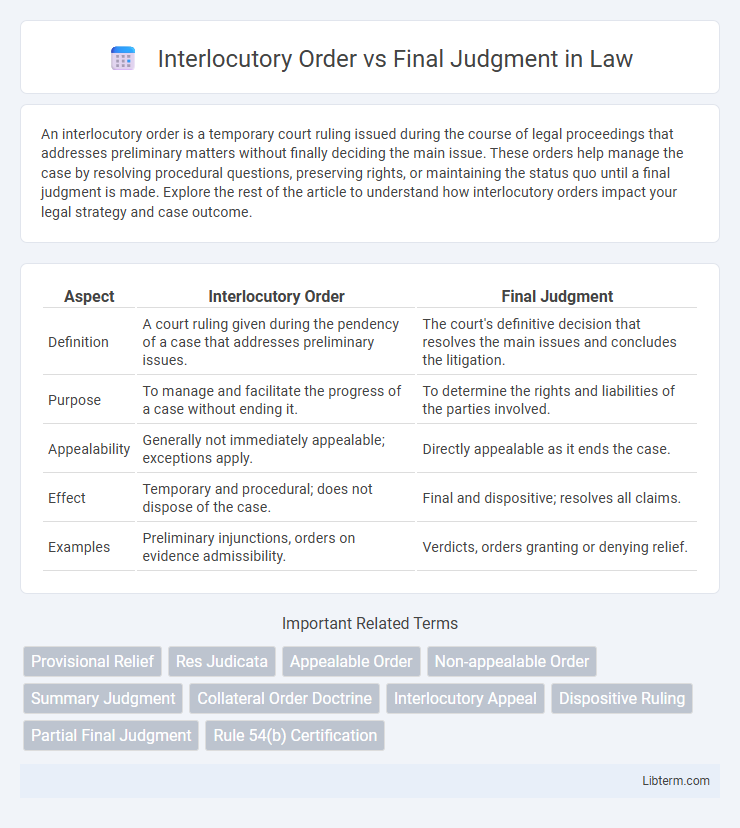An interlocutory order is a temporary court ruling issued during the course of legal proceedings that addresses preliminary matters without finally deciding the main issue. These orders help manage the case by resolving procedural questions, preserving rights, or maintaining the status quo until a final judgment is made. Explore the rest of the article to understand how interlocutory orders impact your legal strategy and case outcome.
Table of Comparison
| Aspect | Interlocutory Order | Final Judgment |
|---|---|---|
| Definition | A court ruling given during the pendency of a case that addresses preliminary issues. | The court's definitive decision that resolves the main issues and concludes the litigation. |
| Purpose | To manage and facilitate the progress of a case without ending it. | To determine the rights and liabilities of the parties involved. |
| Appealability | Generally not immediately appealable; exceptions apply. | Directly appealable as it ends the case. |
| Effect | Temporary and procedural; does not dispose of the case. | Final and dispositive; resolves all claims. |
| Examples | Preliminary injunctions, orders on evidence admissibility. | Verdicts, orders granting or denying relief. |
Introduction to Legal Orders and Judgments
Interlocutory orders are temporary rulings issued by a court during the course of litigation, addressing preliminary or procedural matters without resolving the entire case. Final judgments conclude the legal dispute by determining the rights and obligations of the parties, thereby ending the litigation at the trial level. Understanding the distinction between interlocutory orders and final judgments is crucial for navigating appeals and procedural strategies in legal practice.
Defining Interlocutory Orders
Interlocutory orders are temporary rulings issued by a court during the course of litigation that address procedural or ancillary issues without resolving the main dispute. These orders help manage the flow of a case by deciding matters such as motions for preliminary injunctions, rulings on evidence admissibility, or procedural scheduling. Unlike final judgments, interlocutory orders are not conclusive and typically cannot be appealed immediately, as they do not dispose of the entire case.
Understanding Final Judgments
Final judgments mark the conclusive decision in a legal case, resolving all issues between the parties and ending the litigation. They determine the rights and obligations of the parties, allowing for enforcement and appeals. Unlike interlocutory orders, which address preliminary or procedural matters, final judgments provide the definitive outcome necessary for case closure.
Key Differences Between Interlocutory Orders and Final Judgments
Interlocutory orders are temporary rulings made during the course of litigation that address preliminary or procedural matters, while final judgments resolve the entire case and determine the rights of the parties involved. Interlocutory orders are generally not appealable immediately, except under specific circumstances, whereas final judgments are subject to direct appeal as they conclude the trial court's adjudication. The primary distinction lies in the scope and effect: interlocutory orders do not end the litigation, but final judgments bring it to a close.
Legal Significance of Interlocutory Orders
Interlocutory orders hold significant legal importance as they address urgent or procedural issues during litigation without resolving the entire case, ensuring the smooth progress of judicial proceedings. Unlike final judgments, interlocutory orders are typically not immediately appealable, which prevents delays and promotes judicial efficiency. Courts rely on interlocutory orders to maintain fairness and protect parties' rights while the underlying dispute remains unresolved.
Appeals: Interlocutory Orders vs Final Judgments
Interlocutory orders are temporary rulings made during the course of litigation, typically not immediately appealable except under specific statutory exceptions or when they involve substantial rights. Final judgments resolve all issues in a case and conclude the litigation, allowing parties to file an appeal as of right. Courts prioritize final judgments for appeal to promote judicial efficiency and avoid piecemeal litigation, but interlocutory appeals may be permitted to prevent irreparable harm or to address controlling questions of law.
Common Examples of Interlocutory Orders
Interlocutory orders frequently arise in civil litigation, including rulings on preliminary injunctions, temporary restraining orders, and decisions regarding discovery disputes or evidentiary matters. These orders are issued during the course of litigation to address procedural or substantive issues without resolving the entire case, unlike a final judgment which conclusively determines the parties' rights. Common interlocutory orders also encompass denial or grant of motions to dismiss, appointment of guardians ad litem, and orders concerning the admissibility of expert testimony.
Impact on Case Proceedings
Interlocutory orders affect case proceedings by addressing preliminary or procedural issues without resolving the main controversy, allowing the lawsuit to continue. Final judgments conclude the case by determining the parties' rights and obligations, effectively ending litigation on the merits. The timing and nature of these orders influence appeal options, with interlocutory orders typically non-appealable until final judgment is rendered.
Jurisdictional Variations in Legal Systems
Interlocutory orders and final judgments differ significantly in their impact on case progression, with interlocutory orders addressing intermediate issues and final judgments resolving the entire dispute. Jurisdictional variations arise as some legal systems grant immediate appeal rights for interlocutory orders, while others restrict appeals until a final judgment to prevent piecemeal litigation. These procedural distinctions influence strategic litigation decisions and affect the timing and scope of appellate review across common law and civil law jurisdictions.
Conclusion: Practical Implications for Litigants
Interlocutory orders address preliminary matters and are typically not appealable, enabling cases to proceed efficiently without delay. Final judgments conclude litigation on the merits, providing parties the right to appeal and enforce decisions. Understanding these distinctions helps litigants strategize appropriately, ensuring timely challenges and resource allocation throughout the legal process.
Interlocutory Order Infographic

 libterm.com
libterm.com